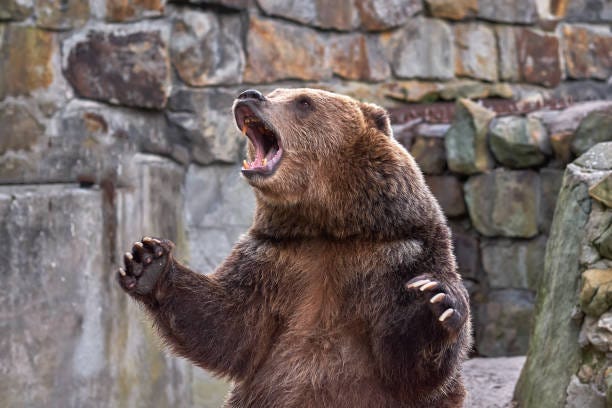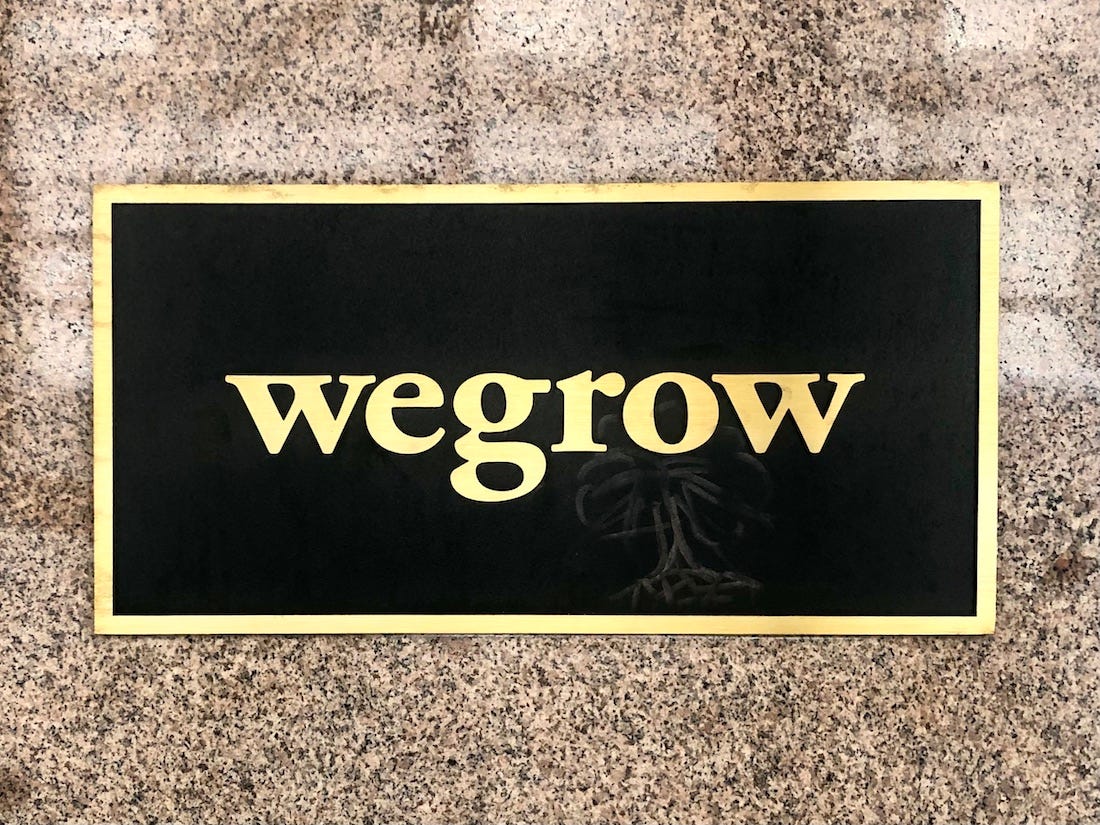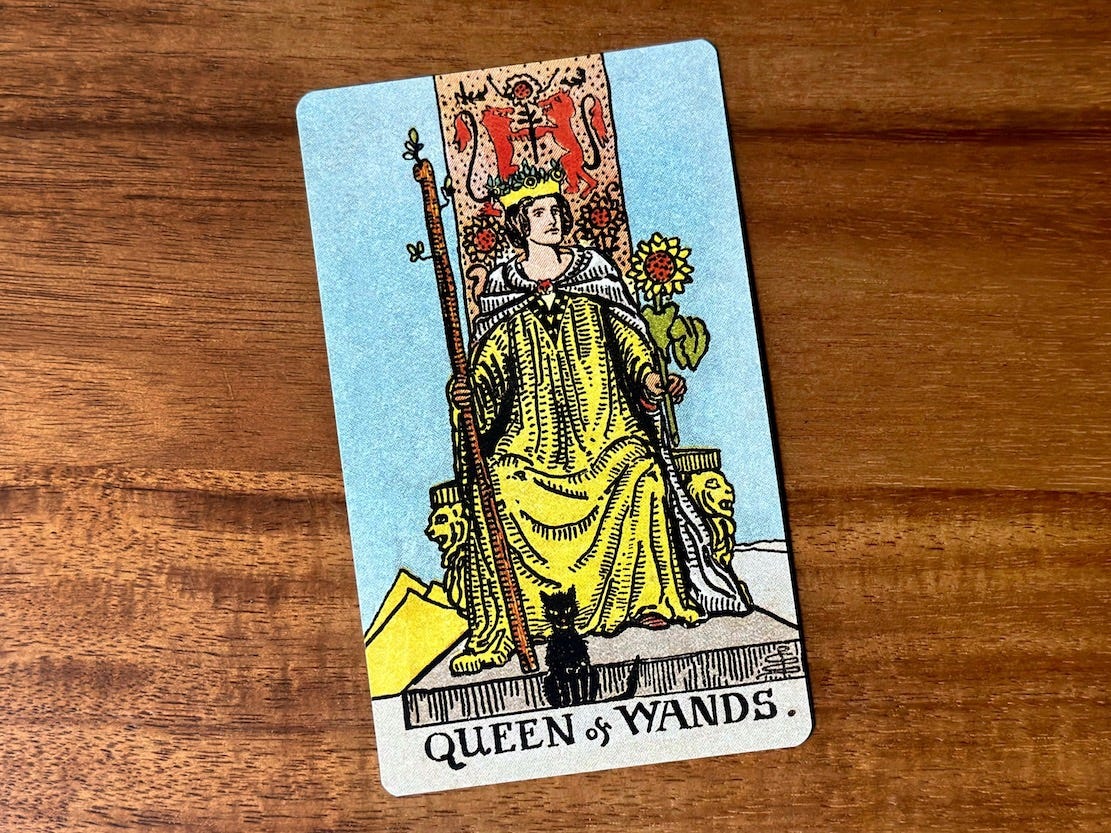One of the challenging things about writing a personal newsletter—besides mining one’s life for material and attempting to translate it into topical weekly essays—is feeling like some of your favorites are lost to the archives. The following is one such essay, which first appeared in the early days, back in October 2021. As there are more of you here now, I’ve decided to reprise it. My changes were few, as my feelings on the topic remain largely the same.
The card reading, however, is all new.
(If you’ve been reading since the very beginning and happen to remember this piece, please know you have my extreme gratitude. I hope you’ll enjoy the refresher.)
Every Sunday, my partner and I have the same conversation.
I’ll sweep into the room with a particular expression we’ve taken to calling “De Niro face.” (Because no one can frown quite like Bob.)
“I’m not sure about today’s newsletter,” I’ll say. “I’m not feeling it.”
“I like it.”
“But is it relevant?”
“Yes.”
“Will anyone relate?”
“You say this every week.”
My name is Caroline and I am a bonafide imposter. For the last fifteen-to-twenty years, I have somewhat successfully impersonated an adult human. I’ve acted like I have my shit together, on the Internet and otherwise, because that is how I’ve been socialized to behave. Inside, however, I have often felt confused, terrified, and despondent.
If ever I mention this, to friends or other trusted connections, the other person immediately replies with their own tales of perceived fraudulence. It seems that everyone, at one time or another, has experienced The Great Self Doubt.
In popular culture, we call it Imposter Syndrome, Impostor Phenomenon, and a host of other names (which have pathologized these very common feelings of anxiety, particularly for women). There is a test (or fifty) to determine if, and to what extent, one experiences this affliction. But as any seasoned self-doubter will attest, you know it when you feel it. The knot in the stomach. The urge to hide. The questioning as to whether something is “deserved,” or whether you belong. The lingering anxiety that at any moment, someone will expose you as a fraud.
There are countless articles written about how to overcome such feelings, suggesting everything from keeping a running list of your accomplishments, to talking to yourself in the mirror, to striking a “power pose” to help boost confidence. I’ll admit that I’ve been known to hold my arms above my head in the lead-up to important meetings. (Whether it works is anyone’s guess.) But when it comes to deeper seated feelings of doubt, these suggestions feel like rational solutions to a rather irrational problem. Like trying to negotiate with a grizzly bear.
I often muse that I wish humans had tails—some outward barometer of the feelings that lie hidden within us. No matter how universal the weather of our internal landscape, we often suffer alone, even when we’re silently suffering together.
A recurring scene: I arrive at a group fitness class. I’ve been here many times before—I know the moves, the music, the choreography by heart.
I consider standing in the front of the studio, but then I think better of it. I don’t want to call attention to myself. I’m not the fittest in the room. I do not rock a matching outfit, or eschew a shirt, like some of my peers. I feel tired. A bit dehydrated. More than a little bit shy.
I choose a spot in the second row. “This is perfect,” I think. “I can see the mirror but I won’t embarrass myself.”
A few moments before class begins, a person I’ve never seen strides into the room and plunks their mat directly in front of me. As the music starts, they proceed to (very confidently) bungle every move. I no longer see my reflection. It has been eclipsed by the price of my own self-doubt.
Last week, I found myself on West 19th Street, where I stumbled across this sign. I stared at it for longer than was appropriate, paying it the kind of rapt attention that is typically reserved for great works of art. To me, it felt like unearthing a relic, the handprint of Icarus himself. Eventually, I snapped this photo and went on my way.
If the branding isn’t familiar, this is a vestige of WeGrow, the now defunct childhood education branch of WeWork, a company whose history is largely a study of the enigmatic characters at its center. There is much to read about WeWork co-founder and former CEO Adam Neumann and his wife Rebekah. The Neumanns’ meteoric rise and rapid fall was, and continues to be, a circus I cannot look away from. (I devoured this documentary, this book, this Vanity Fair piece, this series, all of which I recommend should you wish to traverse down this rabbit hole.) WeGrow, the $42,000-a-year elementary school and Rebekah’s passion project, shuttered in 2019 amidst the company’s financial trouble. In June 2020, she bought back the rights to the curriculum, with plans to re-launch it as SOLFL (pronounced “soulful”) which stands for “Student of Life For Life.”
I find this saga fascinating and inspiring, the same way I feel when I watch a nature documentary. You mean to tell me there are weird little birds that do a freakishly choreographed mating dance? And bears that pole dance on a tree? And CEOs with a messiah complex who manage to secure multibillion dollar investments with the strength of their own bravado? Ah, the majesty of nature.
Most of us will not build and destroy a $47 billion dollar unicorn. Nor should we. But if someone can crash and burn—so epically, so publicly—and still get back up and make like a phoenix, maybe there is something to be gleaned from it.
How do some people believe in themselves, and their vision, to a fault? What thoughts occupy their minds upon first waking, or plague them in the night? Do they have doubts, but are more skilled at assuaging them? Or do they sleep soundly, boldly, confidently, unafraid to fall?
Ironically, the sign also gave me comfort, because its message is true.
We grow. We do! We learn as we go, and hopefully get better with experience. As a friend recently said, “The first time you do something is always the worst. When I first became a manager. The first time I have to present to a new client. The first day at a new job.”
When you find yourself in a daunting or unfamiliar place—new job, new town, new project, new parenthood—you don’t necessarily know that everyone else once was (or still is) winging it, too.
Brené Brown calls them FFTs, “f*cking first times.” You will never be good, or skilled, or comfortable at something you’ve never done before. If you acknowledge that going in, and temper your expectations accordingly, it can help quiet the discouraging voice.
The truth is, no reasonable person expects perfection. The best memoirs are the ones that offer a peek behind the curtain—at the subject’s struggles, demons, insecurities. The most inspiring leaders are the ones who can relate on a human (fallible, mortal) level. It’s funny that our self-doubt is often born from perfectionism, when our flaws are what connect us.
Another recurring scene:
I am in a bookstore, holding a copy of the title du jour.
I am reading words—someone else’s words, words I did not write—and they are excellent. Superhuman. Brilliant, extraordinary words. Cadenced as music. Metered as poetry. Resonant as prayer.
This confirms it, I think. I cannot write. My sentences will never come out this way. What is the point? Who am I to try?
I buy the book. Now it can taunt me at home, too.
My desk faces a wall, which bears a sticky note containing these words: “clearly, and with great honesty.”
It’s a quote from Writing Down the Bones, one of my favorite books about writing (with a touch of Zen). I first stumbled across this phrase some twenty years ago, and it has stayed with me since. For all the fancy advice out there, all the clever turns of phrase, this, to me, is the single most important directive when it comes to writing…and maybe all of life.
The most we can do—the best we can offer one another—is great honesty.
Not to get too Big Bird about it, but the best thing you have to offer is you. Not the resumé version, or the headshot version, but the core of who you are, who you have always been. The world needs your stories, your vision, your experience, your truth.
If we’re aiming for perfection—a fantasy, an impossibility, a cruelty—we’re inevitably going to fall short. But if we’re aiming for authenticity, then we can’t fail.
A beautiful truth: You cannot possibly be an imposter at being yourself.
Card of the Week
Here is this week’s card for the collective, as well as some thoughts to carry into the days ahead. As most modern readers will tell you, the tarot is not about fortunetelling, nor is it about neat, definitive answers. The cards are simply one path to reflection, a way of better knowing ourselves and others through universal themes. If this reading resonates with you, great! And if not, no worries. Take whatever may be helpful and leave the rest.

I have this friend; we’ll call her Jess.
When I first met her, Jess told me she was working on a project in a highly competitive field, in which she had no experience or connections. I nodded my head politely as she shared her plans. It was a long shot, as it would be for anyone. I admired her gumption. I admired her positivity. Good for Jess, I thought, attempting the impossible despite the inevitable disappointment.
Recently, the project sold to great success.
As I’ve gotten to know her better, it almost seems like she has special powers. She’ll express interest in learning some highly specific thing, and the next day an expert will wander into her path. She moves confidently in the direction of her dreams, the Thoreau line come to life.
I regard Jess with a mix of wonder and envy. I don’t begrudge her any of the things she’s made happen. It’s simply that her approach feels foreign to me—the confidence, the surety with which she pursues what interests her. She states her intentions and then finds a way to make them happen.
This is the energy of the Queen of Wands.
Maybe you already operate like Jess. And maybe you don’t. But whatever your current mode, this card has a question it would like you to consider: What if?
What if you entertained the possibility?
What if you proceeded as if?
What if you believed in magic? Not dragons and cauldrons and hocus-pocus—your own magic. The things that light you up and make you come alive. The unseen, inexplicable power that dwells within you.
The Queen of Wands is energetic and passionate. Like Jess, she doesn’t seek permission. She engages with the world, particularly what moves her, however she sees fit.
While the energy of this card is often regarded as ebullient, it reminds us that there is no one right approach to life. You need not have a radiant, go-getter personality to pursue something that matters to you. You may go about it any way you wish, even if it’s slow or quiet or careful. Even if boldness develops with time.
This week’s message isn’t about method, it’s about belief.
After you’ve spent a moment pondering what if, the Queen of Wands has one more question: Why not?
Why not you?
Why not try?
Why not give it a go and see what good may come of it?
Jess doesn’t see any reason not to. And sometimes, neither should you.
















Please continue to write such beautiful newsletters, they are always relevant, touching and funny. This one will stay with me for a long time : « Like trying to negotiate with a grizzly bear »
Just another imposter over here wondering if maybe the true imposter is actually the incorrect assumption that perfection is the norm. Maybe the ideal we're all striving for isn't actually real. Maybe, just maybe, our perceived imperfections are what makes us truly beautiful.
Or maybe I've just had a little too much coffee today.
P.S. Please don't ever not click 'send' on your newsletters.